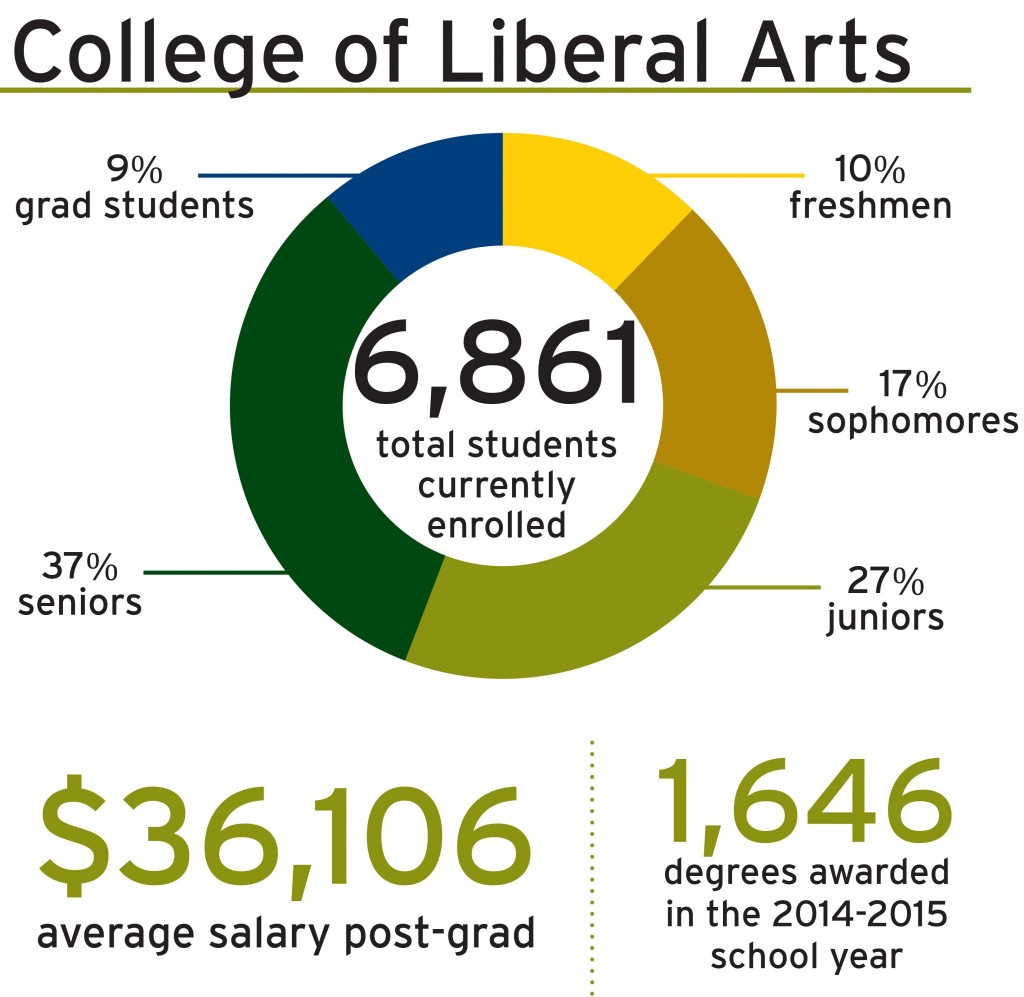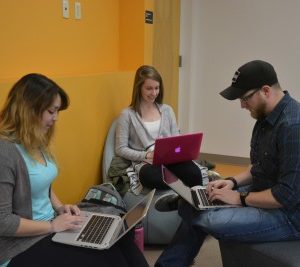By Megan Fischer, as appearing in The Rocky Mountain Collegian

The College of Liberal Arts is the currently the biggest college at Colorado State University. It houses 12 departments, as well as the School of Music, Theater and Dance and two additional programs and majors, which include international studies concentrations, the liberal arts interdisciplinary major and and the LEAP Institute for the Arts.
About nine out of 10 graduates from CSU have either a job offer or secured plans for employment or further education, according to the First Destination Report of 2012-2013 and 2013-2014 graduates. Of the 3,182 students that responded, 776 were graduating with majors within the College of Liberal Arts.

The report said that about 75 percent of the respondents had future plans related to their major.
“I think that international studies is super broad and it’s gonna be hard to decide what to do because it encompasses so much and I don’t know where to start,” said Jess Egnatovich, a senior international studies major.
Engatovich said being conscious of what everyone contributes to different societies and cultures is an important part of what she has learned in her classes that she will carry to her future profession.
In all, there are 6,861 students in the College of Liberal Arts. There are 6,271 undergraduate students, and there are 590 graduate students for the fall 2015 semester, as indicated by Colorado State University’s Institutional Research.
“We’re a very diverse college,” said Kelly Long, associate dean for undergraduate studies within the College of Liberal Arts.
The five largest departments for undergraduates within the College of Liberal Arts are: Sociology, with 731 students; Communication Studies, with 660 students; Languages, Literatures and Cultures, with 637 students; liberal arts intra-college majors, with 607 students; and Journalism and Media Communication, with 507 students.
The Department of Languages, Literatures and Cultures reported that some of their students who studied and majored in Spanish are now teachers, translators, attorneys and reporters in Spanish-speaking countries.
“When you learn another language, you learn another communication system that makes you reflect on your own language,” said Mary Vogl, department chair for the Department of Languages, Literatures and Cultures. “I think that having studied other cultures makes you more aware and more sensitive.”
From a survey by the Association of American Colleges and Universities, 80 percent of the employers surveyed thought college students should acquire knowledge in both the sciences and the liberal arts.
The survey reported that 93 percent of respondents said a capacity to think critically, communicate clearly and solve complex problems is looked at more than a candidate’s undergraduate major.
“These are precisely the skills that students in the College of Liberal Arts acquire, regardless of their major,” said Michele Betsill, the Department of Political Science chair as she cited the survey. “This allows liberal arts students to be more nimble in finding jobs that are not directly related to their majors. Yes, we have many political science majors that go on to law school or work in government, but we also have alumni who are successful in the business world and even a romance novelist.”
While direct numbers for salaries were not given for many of the individual majors within the College of Liberal Arts, the average starting salary upon graduating from the college was estimated at $36,106. Long said it is hard to track data because of the different types of professions a liberal arts degree can lead to.
“Part of the reason we don’t (track this data) is because the data isn’t very helpful to our students given the enormous variance involved,” said Michael Carolan, Department of Sociology Chair. “With degrees like sociology, our students enter into practically every type of job there is, so an ‘average’ starting salary is a problematic statistic.”
Hope Genty, a senior majoring in history and graduating at the end of the 2015 fall semester, explained her plans for after graduation.
“My plan is to stay in Fort Collins until May and work hopefully for the public library, and then I will be going to graduate school in the fall for a master’s of library science,” Genty said.
Genty said she plans on going to graduate school. She will be applying in February and will likely be leaving Colorado.
The two smallest departments within the college are Ethnic Studies, with 141 students, and Philosophy, with 110 students. The Ethnic Studies Department is the newest department to the college and was introduced in 2009.
“What we hope liberal arts majors will contribute to society is the ability to look at something from multiple perspectives, to contribute to innovation and reasoned discourse and to be influential in addressing the issues that confront us as a society and as the world from humanistic perspectives,” said English Department Chair Louann Reid. “The better you can communicate to a larger number of people, the more influential you’re going to be.”
Collegian Reporter Megan Fischer can be reached at news@collegian.com or on Twitter @MegFischer04.